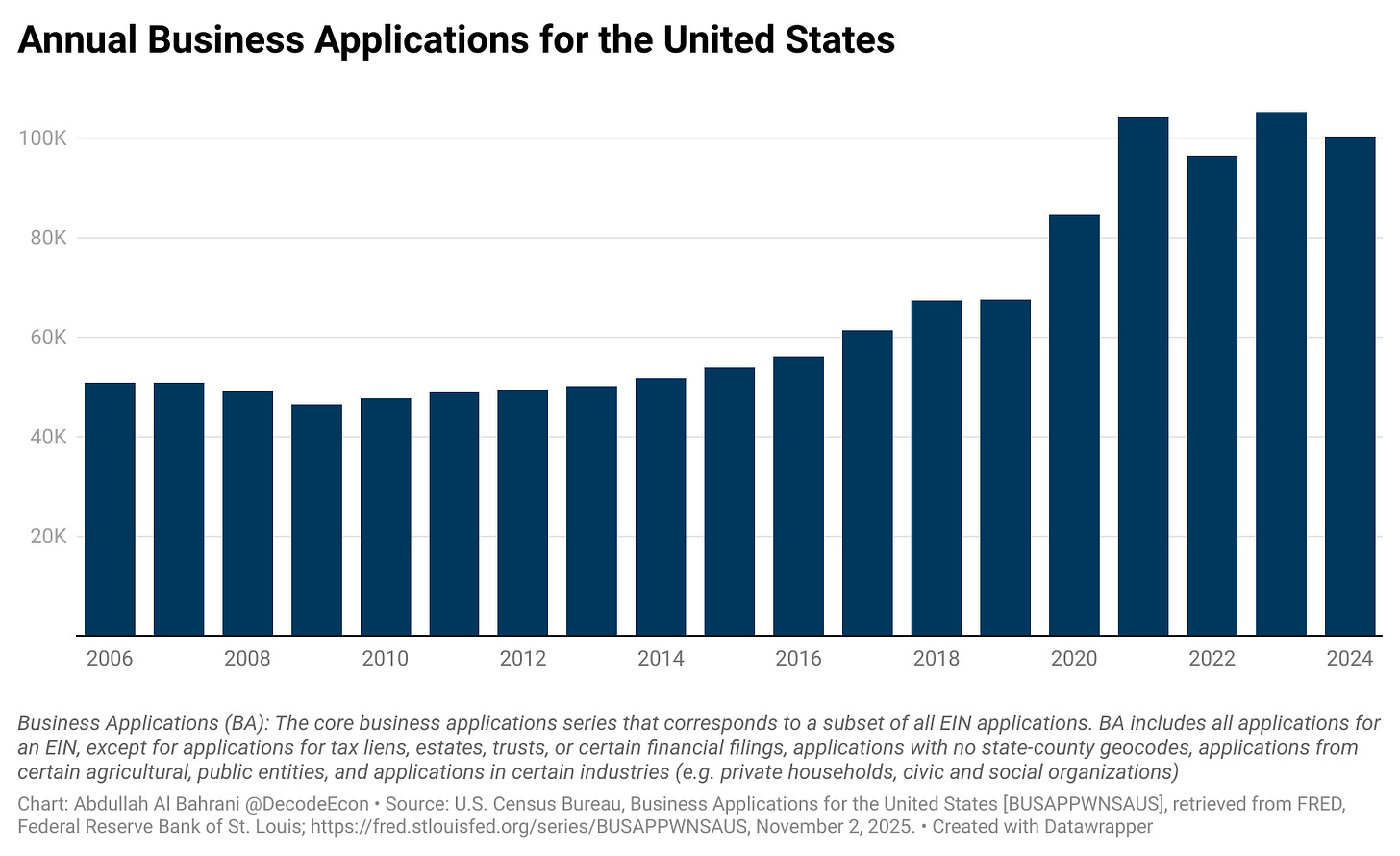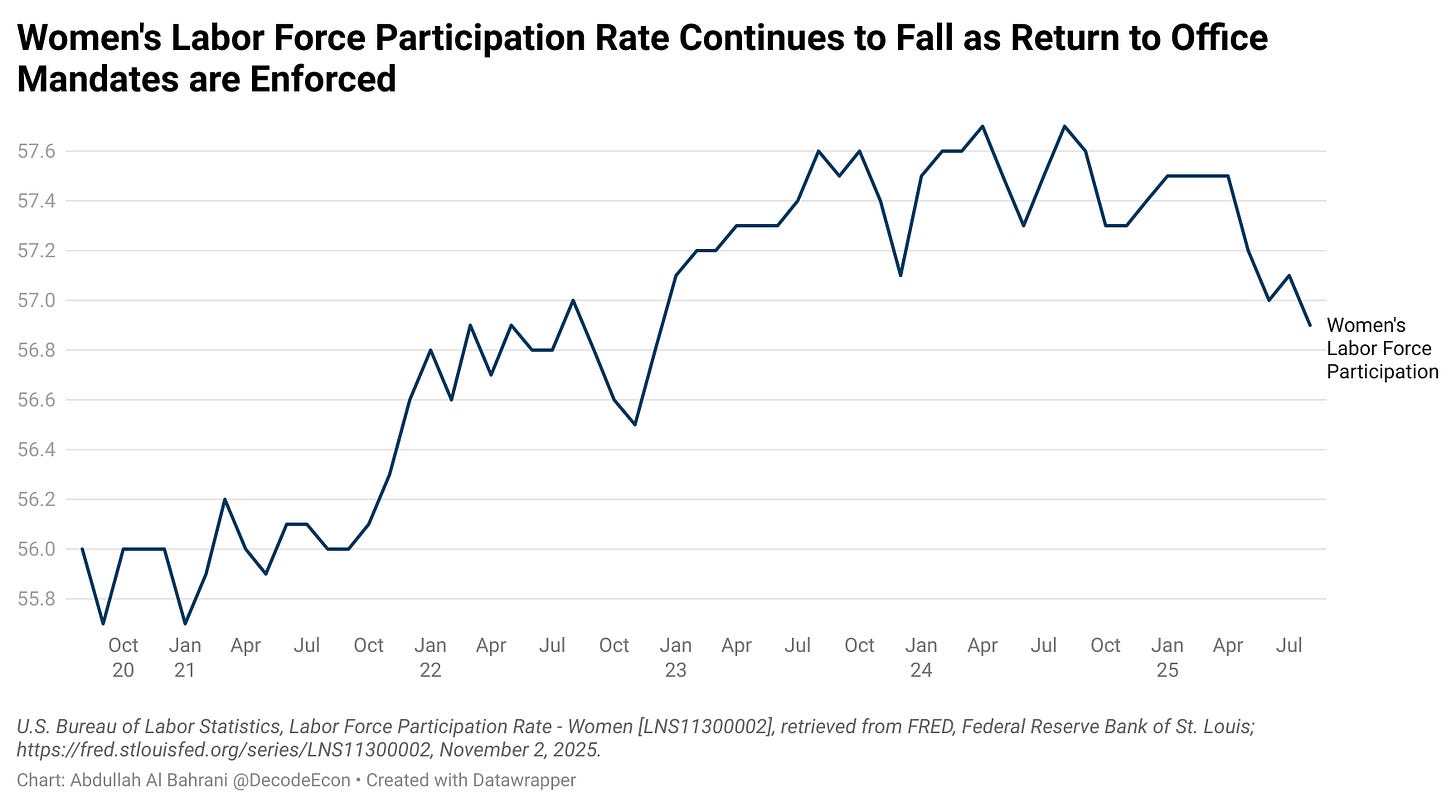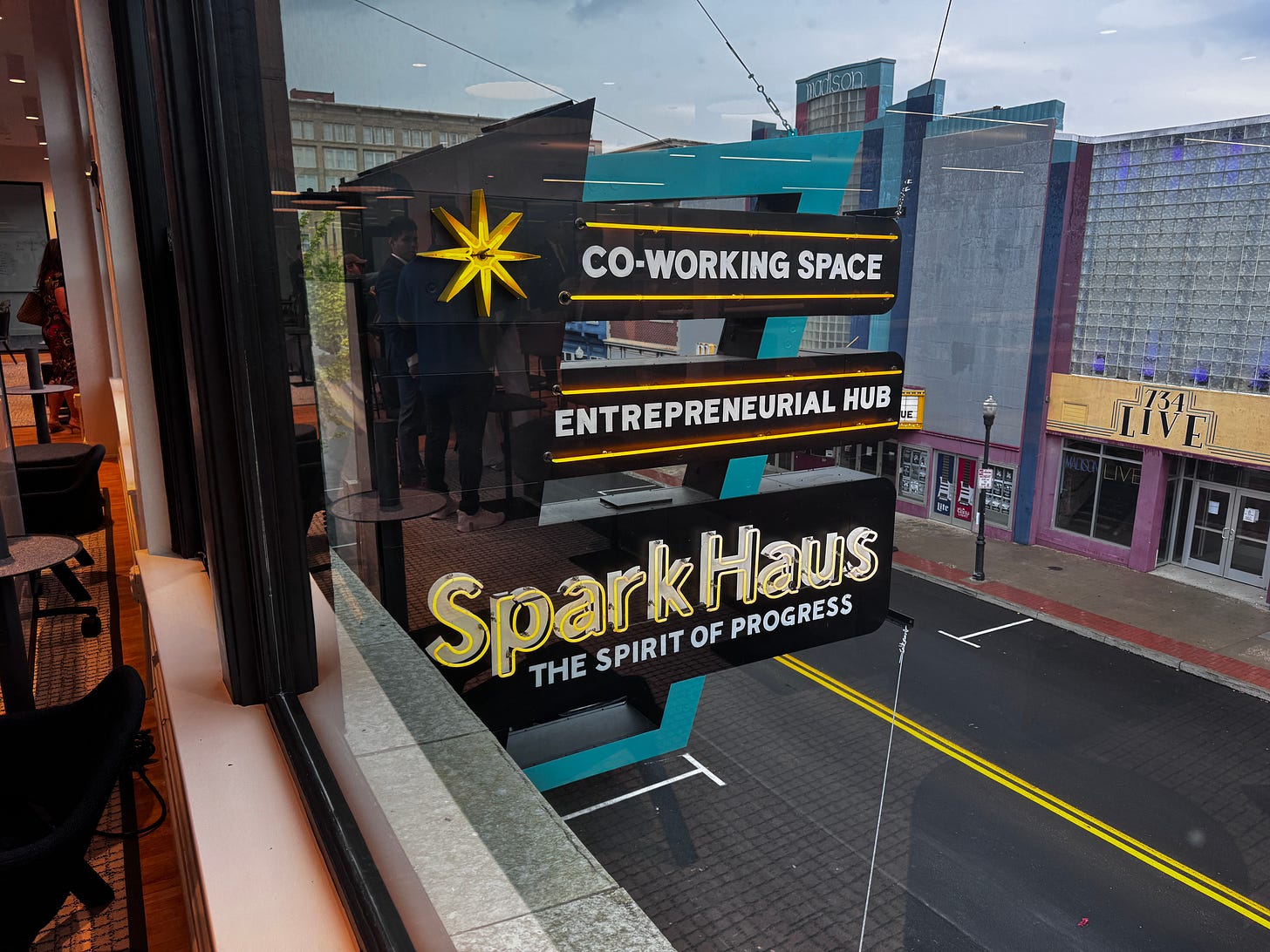The Role of Local Libraries in Promoting Entrepreneurship
How libraries are helping build small businesses
In the first issue of the Libraries and Economic Development series, we examined the return on investment of libraries in promoting reading literacy. Today, we turn to entrepreneurship and the growing role of local libraries in supporting the formation of small businesses, innovation, and the development of intellectual property.
Libraries are no longer just about books; they are centers of community and economic development. Across the country, public libraries have quietly become the most accessible hubs for small-business support, offering free access to market research databases, workshops on business planning, mentorship, and even makerspaces for product design and prototyping.
While many business incubators and accelerators focus on high-growth startups chasing venture capital, libraries fill a critical gap: they empower local entrepreneurs who form the backbone of community economies. These are the sole proprietors, family-run ventures, and nonprofit founders who often get overlooked in the world of pitch decks and unicorn valuations.
Libraries as Connectors in the Entrepreneurial Ecosystem
According to a national evaluation conducted by Knology for the Urban Libraries Council and the Ewing Marion Kauffman Foundation, nearly half of all new business founders (49%) used library resources at some point in their startup process. Their use of resources included internet access, meeting rooms, classes, mentorship, and business databases.
The study found that libraries act as trusted mediators between entrepreneurs and the broader business ecosystem, connecting patrons with partners such as the Small Business Administration, SCORE, and local chambers of commerce.
Their free and low-cost resources are especially valuable for individuals who have historically been underrepresented in entrepreneurship, including women, immigrants, veterans, and founders from lower-income backgrounds, offering them a risk-free way to test ideas and build confidence.
Yet awareness remains a challenge. Roughly 68% of entrepreneurs who did not use library resources reported that they had never considered the library as a business resource, suggesting enormous untapped potential for outreach and partnerships.
A Case Study from Toledo: Libraries as Economic Infrastructure
NPR’s Morning Edition highlighted the Toledo Lucas County Public Library as a model of this transformation. Once known mainly as a reading space, Toledo’s library has evolved into an entrepreneurship hub. In this place, retired autoworkers, first-time founders, and nonprofit leaders come together to build their next chapter. Toledo’s library is helping patrons transition as their local economy changes, helping them find new opportunities when old ones disappear.
Take Marsha Hill, a 66-year-old retired Jeep plant worker who founded Families for Fitness, a nonprofit promoting children’s health. Twice a week, she visits the library’s new small-business and nonprofit workspace. The space is a bright, collaborative space equipped with computers, meeting rooms, and on-site librarians trained in business development. With their help, Hill is building her first website, setting up a GuideStar profile, and preparing to apply for grants.
Her story is one of thousands. Since receiving a grant from the Urban Libraries Council in 2018, the Toledo Lucas County Public Library has served more than 3,100 aspiring entrepreneurs in 2024, nearly double the number from four years prior. Its team of librarians, many of whom are former consultants or business owners, offers free classes in bookkeeping, marketing, grant writing, and e-commerce, helping residents pivot from the city’s shrinking manufacturing base toward self-employment and community-based ventures.
As business specialist Linda Faye Lucas explained, “I’ve been able to do what I did for people that never would have been able to afford the services.”
Recession, Workforce Shifts, and a Surge of Small-Business Formation
Economic downturns and shifts in workplace policy are creating fertile conditions for a new wave of small-business growth, particularly among women and other underserved populations.
Entrepreneurship during recessions- Research from the JPMorgan Chase Institute shows that new business formation often accelerates during downturns, driven by “necessity entrepreneurs” who start ventures after layoffs or reduced work hours.
Although first-year revenues may be lower for firms founded during recessions, the total number of new enterprises rises sharply, providing critical local job creation and resilience. Similarly, the U.S. Treasury Department reported that small businesses generated 71% of net private-sector job gains between 2019 and 2024, up from 64% in the prior recession/recovery, underscoring their stabilizing role during economic turbulence.
Women and workforce re-entry. At the same time, labor-force participation among women is softening due to the collision of caregiving demands and increasingly rigid “return-to-office” (RTO) mandates. A recent KPMG analysis found that college-educated mothers with young children experienced a decline in participation, from approximately 80% in 2023 to 77% in 2025. Meanwhile, an Axios report and a TIME Magazine feature linked this decline to inflexible RTO policies and shrinking childcare support. As many women leave traditional employment, entrepreneurship emerges as a practical alternative, offering flexibility, autonomy, and a sense of purpose.
Implications for libraries. Together, these forces point to a forthcoming surge in small-business creation, particularly among women seeking flexible income and control over their time. Local libraries are uniquely positioned to respond. Their free classes, digital skills training, and mentorship programs lower barriers for those entering entrepreneurship not by choice, but by circumstance. For many of these new founders, the local library may be their first, and most trusted, business incubator.
The Broader Impact: Building Local Entrepreneurial Ecosystems
Findings from the Urban Libraries Council’s Strengthening Libraries as Entrepreneurial Hubs initiative show that libraries are becoming critical local infrastructure for entrepreneurship. They provide mentoring, low-barrier training, and access to business tools that would otherwise be out of reach. Libraries’ entrepreneurship programs also serve as inclusive incubators, welcoming people who may feel excluded from traditional business networks or formal incubator spaces.
But the next frontier isn’t just what libraries can do alone; it’s how they connect. The future of inclusive entrepreneurship lies in building ecosystems that bridge libraries, universities, and regional partners to foster collaboration and innovation.
NKY and Cincinnati’s Entrepreneurship Ecosystem
In Northern Kentucky, this ecosystem is taking shape in real time. Blue North, the region’s innovation hub, is forging dynamic partnerships that link entrepreneurial resources across sectors. The growing partnership between Blue North and the Kenton County Public Library (KCPL) is redefining what community-based entrepreneurship looks like. Together, they’re building programs that combine the library’s accessible learning spaces and digital tools with Blue North’s mentoring, venture-capital access, and startup coaching.
These partnerships exemplify the ecosystem approach described in the Knology/Kauffman research: libraries serve as trusted entry points, universities provide research and talent, and entrepreneurial hubs, such as Blue North, offer the network and capital to help ideas scale. When these institutions align, they create an inclusive, sustainable pathway for small-business growth, one rooted in collaboration.
The Bottom Line
If incubators are laboratories for innovation, libraries are launchpads for access. They nurture the smallest of businesses, the sole-proprietor gardener, the home-based childcare provider, and the local author. Their work proves that inclusive entrepreneurship begins not in Silicon Valley, but often on the library’s public Wi-Fi.
And when those libraries are connected to universities and organizations like Blue North, they become something even more powerful: the backbone of a regional innovation ecosystem that ensures everyone, regardless of background or capital, has a place to start.
Are you interested in starting a business? You can start by visiting your local public library.
Resources
Axios. (2025, October 2). Women are leaving the workforce amid return-to-office mandates. Retrieved from https://www.axios.com/2025/10/02/women-jobs-rto
Hsu, A. (2024, October 11). Where manufacturing jobs have shrunk, a library is giving a leg up to entrepreneurs.National Public Radio (NPR). Retrieved from https://www.npr.org/2024/10/10/nx-s1-5107904/public-library-small-business-nonprofit-entrepreneurs
JPMorgan Chase Institute. (2024). When opportunity knocks: How economic cycles shape entrepreneurial ventures and their success. Retrieved from https://www.jpmorganchase.com/institute/all-topics/business-growth-and-entrepreneurship/when-opportunity-knocks
KPMG Women’s Leadership Research Center. (2025). Workforce participation and return-to-office trends among women professionals. KPMG Insights.https://kpmg.com/us/en/articles/2025/october-2025-the-great-exit.html
Norlander, R. J., Gupta, R., Brucker, J. L., Thomas, U. G., Musser, A., Field, S., & Attaway, B. (2022). Entrepreneurship: Where urban libraries fit. Knology Publication # NPO.180.636.15. New York: Knology Ltd. Prepared for the Ewing Marion Kauffman Foundation. https://www.urbanlibraries.org/files/White-Paper_Libraries-as-Ent-Hubs_2022-04-26.pdf
Time Magazine. (2025, September 24). Why women are reconsidering full-time work as return-to-office policies tighten.Retrieved from https://time.com/7306896/women-leaving-workforce/
U.S. Department of the Treasury. (2025). Small business and entrepreneurship in the post-COVID expansion. Retrieved from https://home.treasury.gov/news/featured-stories/small-business-and-entrepreneurship-in-the-post-covid-expansion








I've always been a fan of libraries, and for me a job elimination has elevated the incredible value of libraries in my eyes. Kenton County has an amazing career group for people in professional transition, and topics include resources and support for entrepreneurs. I am currently a "necessity entrepreneur" who can easily see this becoming a long-term endeavor. Hats off to entrepreneurs, hubs and ecosystems, and innovative libraries!
Libraries are a public good that is a part of the foundation that created modern society. I am not surprised that it supports entrepreneurship and innovation